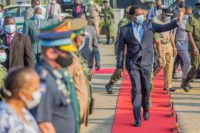The Electoral Commission of Zambia (ECZ) says Government Printers currently lacks capacity to print ballot papers.
And the ECZ says Zambian citizens in the Diaspora and those with dual citizenship are allowed to vote.
Meanwhile, ECZ Director of Information and Communication Technology Dylan Kasonde has dismissed allegations that the commission was receiving directives from the President to do its work.
Speaking on ZNBC’s Sunday Interview, Kasonde said the Government Printers cannot meet the required standards for ballot papers.
“Currently as it stands, Government Printers is unable to meet our standards although we know [that] they are working on enhancing their capacities to ensure that they reach that standard. I think there were also sentiments by the University of Zambia that they have now come up with the printing department and we have got other private printers out there who feel they are equal to the task. So it will be up to them to prove themselves when the commission tenders this ballot printing job very soon so that they can prove their competence. But that is only subject to them meeting the technical requirement and all the business requirements that the commission requires,” Kasonde said.
He expressed optimism that ballot papers could be printed locally “as long as capacity is there”.
“It is feasible to print [ballot papers] locally if at all capacity is available locally. The commission has stringent technical specifications for printing of a ballot paper. So it’s not any other document that you can just print using a laser printer. This is a security document that has to be printed by a security printer. And the commission will be undertaking an open bidding procurement process. So for those Zambians who feel that they have got the capacity to do that, they will be given a chance to participate in this tender and if at all they will be proved to be competent and they price themselves competitively, they might have a chance. But the commission is not directly looking at someone printing locally. It is about meeting the requirements of the commission.”
On the commission’s transparency when conducting elections, he said the ECZ has always provided voter registers to all stakeholders for monitoring purposes.
“The voter registers for the entire country are actually availed to all presidential candidates for free. In 2016, we had nine candidates and every candidate was given a register. Then we also have political parties, civil society organizations, the commission sells registers to CSO and also faith-based organizations. So when they go in a polling station to monitor, they actually have a copy of registered voters for that particular polling station. So in terms of transparency and watertight, we have done our part as a commission and we will keep on enhancing the process,” Kasonde said.
He further dismissed claims that the ECZ was getting directives from the Head of State.
“The commission does not take directives from the president or anyone. The commission is an independent electoral commission set by the Constitution and set by the Electoral Commission Act. So when it comes to procurement, the commission drives its own agenda in terms of how it feels certain processes should move,” Kasonde said.
Meanwhile, Kasonde disclosed that ECZ would next year undertake a countrywide fresh voter registration exercise for the 2021 general elections.
“Next year, the commission will start voter registration and this time around, the commission wants to start a new register altogether. It will start on a clean slate. And particularly for the young ones, the commission will start online registration. It is not online from end to end but it’s online in that a link will be provided where anyone can put their details in their own space and time and that at a convenient time, go to strategic places where the commission will have registration officers stationed with equipment so that they can then go and capture their biometrics and then print a card for them,” he added.
“But besides that, the commission will still undertake the usual mobile registration of voters and also district registration voters thereafter to ensure that the young ones who are attaining the age of 18 and indeed all eligible citizens can register. For 2021 elections, we are compiling a new register of voters, meaning everyone has to register afresh. However, if we have a by-election between now and 2021, we will fall back on the current register to conduct those by-elections. Otherwise, everyone will have to register and a new card will be issued to them for use in the 2021 elections. So the current voter register will not be used in 2021 elections.”
And Kasonde said Zambians in the Diaspora and those with dual citizenship are allowed to vote.
“We have a large population in the Diaspora and now that we have dual citizenship, those people are actually allowed to vote [and] even those Zambian nationals but domiciled outside the country. So the commission is looking at several ways of how this can be implemented. Most of our SADC countries use their embassies as polling stations and even as registration centers. So it’s something the commission is exploring,” said Kasonde. “The commission is currently engaging our neighboring countries…we have Electoral Commission Forum for SADC countries and indeed other countries outside the continent on how they have managed to implement the voting for prisoners because we have to look at certain modalities like how do you make political party A to campaign in a prison? How do you register voters in a prison? How do you ensure that stakeholders are accredited to monitor how elections are going on in a prison? Hopefully, if this is done in earnest, something can be done in 2021 maybe in terms of a pilot and then rolled out countrywide hopefully for 2026.”












